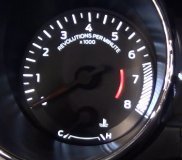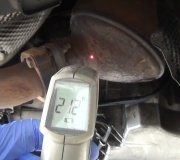Hi neverenough. Welcome to the forum. I'm actually having the same problem with a '95 but it only acts up about once per month. I haven't looked into it yet but the problem was not solved when the fuel pump was replaced for a different problem.
One thing that might be misleading you is your observation about fuel pressure and volume. The mistake you made is you thought this out logically. That doesn't apply to the fuel supply system. The largest volume of fuel flows during coasting. Under heavy acceleration, relatively little fuel flows from the pump. The secret is pump volume and injector volume are totally different. Think of a fellow about to jump out of a perfectly good airplane. Two forces are acting on him. The vacuum from the air flow past the open door, and the huge guy behind him pushing him out. If vacuum increases, that guy pushing him doesn't need to be so big.
Now compare that to a molecule of fuel waiting to jump from the tip of the injector. Two forces are acting on it too; intake manifold vacuum and fuel pressure. When manifold vacuum goes up during coasting, that pulls harder on the molecule and his buddies so more of them are pulled into the engine. That would result in an excessively rich mixture during coasting. To prevent that, a vacuum hose going to the fuel pressure regulator causes the fuel pressure setting to go down. The net difference in the two forces stays the same so no rich condition occurs.
The fuel pressure regulator is a spring-loaded diaphragm with a return port to send unused fuel back to the tank. When increased vacuum helps that spring relax, it is much easier for the extra fuel to get through the port and go back to the tank. That means the pump is pushing fuel against less of a restriction so it is easier to move more fuel.
The more common symptom, although somewhat rare, is engine dying when letting off the gas pedal due to a restricted fuel pickup sock inside the tank. When this happens, the engine runs fine at highway speed and when accelerating because manifold vacuum is low so fuel pressure goes up. The pump can easily build the required pressure and since its pushing against a more restricted pressure regulator, much less volume is needed. That lower volume can get through the restricted pickup screen, (sock).
This bares mentioning, but I don't think it is related to your problem. When a sensor fails completely, it will be detected by the Engine Computer which will set a diagnostic fault code in memory and turn on the Check Engine light. It is also possible for some sensors to not fail completely but they send an incorrect value to the computer. As long as the incorrect value is within acceptable limits, the computer will believe it and not set a fault code. The easiest way to find this type of problem is by connecting a hand-held computer, called a scanner, that displays live sensor data and has a record / playback function. Your mechanic drives the vehicle, then presses the "record' button when the problem occurs. Since the data is stored temporarily in memory as it passes through the scanner, the recording actually starts a few seconds before the button is pressed. Later, the recording can be played back frame-by-frame while watching each sensor for a glitch or dropout. The advantage you have is it sounds like your van acts up most of the time so it won't take long to get the recording.
The only thing that is not monitored is the fuel supply system so no fault codes will be set related to fuel pressure or volume, but if that's the system causing the problem, it will still show up in the oxygen sensor readings as an excessively lean or rich exhaust gas.
Caradiodoc
SPONSORED LINKS
Saturday, April 17th, 2010 AT 2:51 PM



